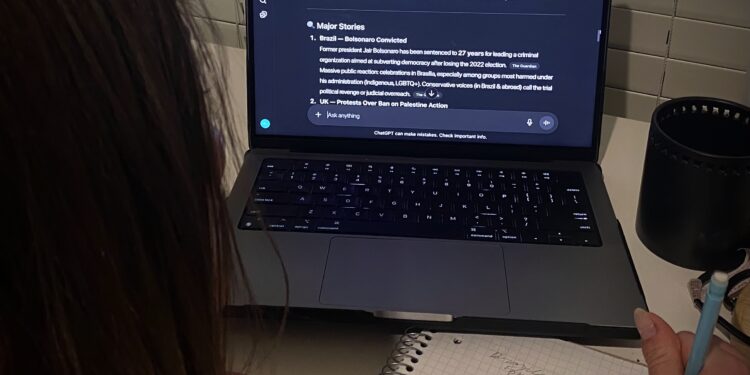Artificial Intelligence (AI) is becoming an increasingly unavoidable aspect of modern life. It is being used in music and art, both to create and plagiarize. It is already causing adverse environmental effects due to its data centers’ massive water and electricity needs according to the Associated Press. Tech companies are striking deals with the US government to implement their AI technology in databases, after proving their chatbots aren’t ‘woke,’ per a recent order by President Trump (Associated Press). Young people are even finding companionship in AI chatbots.
AI’s commonality in society is being reflected in education, with some schools becoming more friendly to AI use in the classroom. However, for many collegiate institutions, approved uses of AI are still being investigated. Samford’s Dean of Howard College of Arts and Sciences, Dawn McCormack, has been doing some investigating of her own.
“AI is both something that is extremely exciting because of the doors it will be able to open, but it is also frightening at times because of some of the things it will be able to do,” McCormack said. “It is something that is already so important for employment prospects for students, and for us to be able to extend what we are capable of doing.”
McCormack explained that employers are asking applicants if they have experience interacting with AI, and many occupations and fields — like those in research and data — are already changing rapidly. This also means that applicants must understand the proper uses and ethical practices of AI.
“It is important that our students learn to use AI ethically, because if you use AI to cheat, for one, it is a very shallow use of it. Also, if AI can do your task for you, and you haven’t developed any skills beyond that, then why would an employer hire you?” McCormack said.
There are also many questions surrounding AI’s effect on job security, and it is becoming a growing concern for students, particularly those in the arts. In a recent anonymous poll conducted by the Samford Crimson, an English major expressed their concerns about AI replacing the need for writers and editors, stating, “I am scared that AI is going to replace genuine talent and learning (…) Whenever you can use ChatGPT to write a perfect paper, who needs a person to edit it? Who needs a person to write it?”
When asked about the potential effects of AI on job security, McCormack said, “I think that there are certainly threats, and I think that almost every discipline is going to look different in the future, but that doesn’t mean that our disciplines don’t provide expertise for students.”
McCormack said that the liberal arts education that Samford provides instills qualities that will be needed regardless of AI, like strong critical thinking skills and a code of ethics.
“The framework that our disciplines provide for students — adaptability, rigor, those are the kinds of things that are not going anywhere. And those are very beneficial to society,” said McCormack, noting that these values are more important now than ever.
As for implementing AI in the classroom, McCormack said that there is still much work to be done before AI becomes a regularly used tool.
“I think we have to have lots of discussions. This semester I am starting to have discussions with faculty about this. We need to make sure that we don’t limit students too much because then they won’t get the exposure that they need,” she said.
McCormack stated that for Samford’s Howard College of Arts and Sciences, AI use will be determined by faculty members, and that for some professors, this may mean using little to no AI in the classroom. As for her role, McCormack plans to provide opportunities for faculty and students to interact with AI as they see fit.
Every innovation comes with its own set of challenges, and Artificial Intelligence is not an exception to this rule. The road to integrating AI in classrooms is one that requires adaptability and a deeper understanding of technology and its ethical uses. As Artificial Intelligence becomes further ingrained in our lives, the importance of our uniquely human qualities, like our capacity for empathy, growth and creativity, cannot be understated.

Staff Reporter




